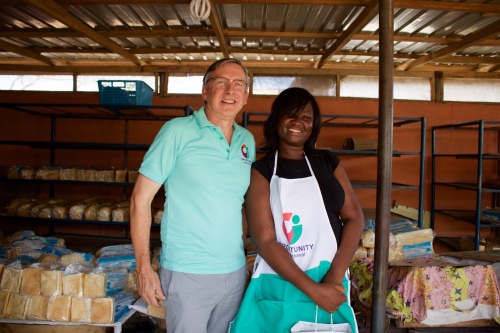
ROBERT DUNN, global executive director of microfinance and development organisation Opportunity International, says having a bank account for financial transactions benefits both the individual and society as a whole…
The latest World Bank report on financial inclusion reveals the number of people in developing countries who have a bank account is on the rise, but 1.7 billion adults are still ‘unbanked’, with women less likely to have a bank account than men.
Using a bank account for financial transactions is critically important for both individuals and economies. When individuals don’t have an account, they use informal means to save, borrow and manage money. They may try to save by hiding money, but this is risky, and savings can be lost, stolen or spent. When they need funds to deal with illness, death in the family or other emergencies they often borrow from pawnbrokers who charge exorbitant interest rates. They may struggle to repay the loan as it accrues interest at an alarming rate, plunging them into a deeper level of poverty.

Opportunity International CEO Robert Dunn with bakery owner Linda in Ghana. PICTURE: Opportunity International Australia.
“Living and working in the informal economy is risky and unpredictable and keeps families trapped in poverty. On the other hand, regularly using a bank account for financial transactions enables people living in poverty to build income-generating businesses, save for emergencies, invest in education and manage risk. It empowers women, boosts productive investment and consumption and may reduce income inequality.”
Living and working in the informal economy is risky and unpredictable and keeps families trapped in poverty. On the other hand, regularly using a bank account for financial transactions enables people living in poverty to build income-generating businesses, save for emergencies, invest in education and manage risk. It empowers women, boosts productive investment and consumption and may reduce income inequality.
As well as benefiting individuals, uptake of formal financial services drives national economic growth and social development. It also reduces poverty and can reduce gender inequality. Given these benefits, many governments in developing countries are working hard to increase the proportion of their population with a bank account.
It’s encouraging to see that the ubiquitous mobile phone has the potential to increase financial inclusion across the developing world. The World Bank reported that one billion people who lack a bank account have a mobile phone and nearly 480 million have internet access. And 44 per cent of adults in developing countries (70 per cent of account holders) reported that they have made or received at least one digital payment using their account in the last year. There is rapid uptake of mobile phones across the developing world and intense competition between telecommunications companies is driving down costs, making calls and mobile internet access more affordable for families living in poverty.
Using a mobile phone to conduct financial transactions enables people living in poverty to access financial services anywhere, anytime, reducing travel and transactions costs and the need to take time off work to travel to the closest bank – which is often in a distant town. It also increases the security of transactions and enables the accumulation of savings at a higher rate.
However, digital technology alone is not enough to increase financial inclusion and tailored approaches are required to enable the most marginalised people to capture the benefits of digitisation. One issue requiring attention, is the 14 per cent gender gap in mobile phone ownership (38 per cent in South Asia), with significantly fewer women using mobile internet services than men. In developing countries, the myriad of legal, social, cultural and economic inequalities that exclude women from fully participating in the economy and society also restricts their use of mobile phones.
One way we can support women’s use of mobile phones is to implement tailored measures that address their specific needs. Opportunity International helps its predominantly female loan recipients in developing countries to use low-cost mobile phones to make loan repayments and save by configuring services in a way that makes transactions simple. This takes account of the high rates of illiteracy amongst Opportunity’s client base.
“Many of Opportunity’s clients lack technical skills and experience using mobile phones, so we provide them with specialised training and peer support.”
Many of Opportunity’s clients lack technical skills and experience using mobile phones, so we provide them with specialised training and peer support. Opportunity teaches women to recognise certain functions like ‘send’ and ‘receive’ and it uses voice-based lessons in the local dialect on money management, how to save and other financial literacy topics. In this way, Opportunity enables women to become fluent and confident in using mobile phones for financial transactions, running their businesses and accessing a variety of information services.
Given the immense value of financial inclusion to individuals and economies, it is critically important that development efforts focus on getting more people connected to formal financial services. Mobile phones offer a pathway to financial inclusion, but it’s not just a matter of driving technology uptake. Our development approaches must be tailored according to the specific needs of the world’s most vulnerable people so they can confidently use digital tools to improve their standard of living.
Robert Dunn is the global executive director of microfinance and development organisation Opportunity International.
Correction: Mr Dunn’s title was initially given as CEO of Opportunity International Australia. That was a previous position – his current position is global executive director of microfinance and development organisation Opportunity International. The error was made in editing.






